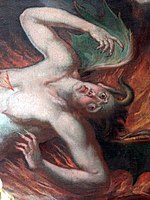War in Heaven
The War in Heaven was a mythical conflict between two groups of angels in traditional Christian cosmology, attested in the Book of Revelation alongside proposed parallels in the Hebrew Bible and the Dead Sea Scrolls. It is described as the result of the Archangel Satan rebelling against God and leading to a war between his followers and those still loyal to God, led by the Archangel Michael. Within the New Testament, the War in Heaven provides basis for the concept of the fallen angels and for Satan's banishment to Christian Hell.[1][2] The War is frequently featured in works of Christian art, such as John Milton's epic poem Paradise Lost, which describes it as occurring over the course of three days as a result of God the Father announcing Jesus Christ as His Son.
Dead Sea Scrolls
Some scholars discern the concept of a war in heaven in certain Dead Sea Scrolls: namely, the War of the Sons of Light Against the Sons of Darkness (also known as the War Scroll; 1QM and 4Q491–497), Song 5 of the Songs of the Sabbath Sacrifice (4Q402), and the Melchizedek document (11Q13).
In the War Scroll, according to Menahem Mansoor, the angels of light, who are identified with Michael, the prince of light, will fight in heaven against the angels of darkness, who are identified with Belial, while the Sons of Light fight the Sons of Darkness on earth, and during the last of the seven battles described in the scroll will come and help the Sons of Light win the final victory.[23]
James R. Davila speaks of Song 5 of the Songs of the Sabbath Sacrifice as describing "an eschatological war in heaven similar to that found in 11Q13 and to traditions about the archangel Michael in the War Rule and the book of Revelation".[24] He suggests that Melchizedek, who is mentioned both in the Melchizedek document and the fifth song of the Songs of the Sabbath Sacrifice, may be a divine warrior who is involved in the conflict with the archangel Michael in the futurist sense.
That the Melchizedek document (11Q13) concerns a war in heaven is denied by Fred L. Horton, who remarks that "there is no hint in the extant portion of the 11Q Melchizedek of a revolt of heavenly beings against the heavenly council, and the only dissenting spirit is the traditional Belial";[25] the view of Davila, however, is that the document originally was about an eschatological war in heaven, with Melchizedek as angelic high priest and military redeemer.[26]








